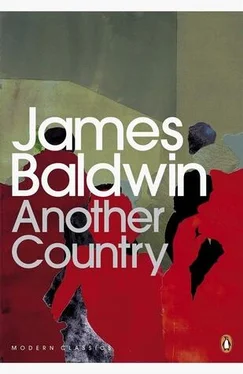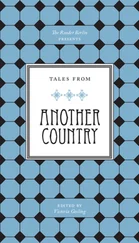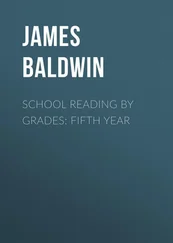He drank his whiskey very slowly, watching and listening to the crowd around him. They had been college boys, mostly, in his day, but both he and they had grown older and he gathered, from the conversations around him, that the college boys had graduated into the professions. He had his eye, vaguely, on a frail, blonde girl, who also seemed, somewhat less vaguely, to have her eye on him: incredibly enough, she seemed to be a lawyer. And he was abruptly very excited, as he had been years ago, at the prospect of making it with a chick above his station, a chick he was not even supposed to be able to look at. He was from the slums of Brooklyn and that stink was on him, and it turned out to be the stink that they were looking for. They were tired of boys who washed too much, who had no odor in their armpits and no sweat on their balls. He looked at the blonde again, wondering what she was like with no clothes on. She was sitting at a table near the door, facing him, toying with a daiquiri glass, and talking to a heavy, gray-haired man, who had a high giggle, who was a little drunk, and whom Vivaldo recognized as a fairly well-known poet. The blonde reminded him of Cass. And this made him realize — for the first time, it is astonishing how well the obvious can be hidden — that when he had met Cass, so many years ago, he had been terribly flattered that so highborn a lady noticed such a stinking boy. He had been overwhelmed. And he had adored Richard without reserve, not, as it now turned out, because of Richard’s talent, which, in any case, he had then been quite unable to judge, but merely because Richard possessed Cass. He had envied Richard’s prowess, and had imagined that this envy was love.
But, surely, there had been love in it, or they could never have been friends for so long. (Had they been friends? what had they ever, really, said to one another?) Perhaps the proof of Vivaldo’s love resided in the fact that he had never thought of Cass carnally, as a woman, but only as a lady, and Richard’s wife. But, more probably, it was only that they were older and he had needed older people who cared about him, who took him seriously, whom he could trust. For this, he would have paid any price whatever. They were not much older now, he was nearly twenty-nine, Richard was thirty-seven or thirty-eight, Cass was thirty-three or thirty-four: but they had seemed, especially in the blazing haven of their love, much older then.
And now — now it seemed that they were all equal in misery, confusion, and despair. He looked at his face in the mirror behind the bar. He still had all his hair, there was no gray in it yet; his face had not yet begun to fall at the bottom and shrivel at the top; and he wasn’t yet all ass and belly. But, still — and soon; and he stole a look at the blonde again. He wondered about her odor, juices, sounds; for a night, only for a night; then abruptly, with no warning, he found himself wondering how Rufus would have looked at this girl, and an odd thing happened: all desire left him, he turned absolutely cold, and then desire came roaring back, with legions. Aha, he heard Rufus snicker, you don’t be careful, motherfucker, you going to get a black hard on . He heard again the laughter which had followed him down the block. And something in him was breaking; he was, briefly and horribly, in a region where there were no definitions of any kind, neither of color, nor of male and female. There was only the leap and the rending and the terror and the surrender. And the terror: which all seemed to begin and end and begin again — forever — in a cavern behind the eye. And whatever stalked there saw, and spread the news of what it saw throughout the entire kingdom of whomever, though the eye itself might perish. What order could prevail against so grim a privacy? And yet, without order, of what value was the mystery? Order. Order. Set thine house in order . He sipped his whiskey, light-years removed now from the blonde and the bar and yet, more than ever and most unpleasantly present. When people no longer knew that a mystery could only be approached through form, people became — what the people of this time and place had become, what he had become. They perished within their despised clay tenements, in isolation, passively, or actively together, in mobs, thirsting and seeking for, and eventually reeking of blood. Of rending and tearing there can never be any end, and God save the people for whom passion becomes impersonal!
He went into the phone booth again, and, hopelessly, rang his number. It rang and rang. He hung up and stood in the booth for a moment. Now he wondered if something had happened to Ida, if there really had been some family crisis: but it was too late, now, to call the woman who lived next door to Ida’s family. Again, he thought of calling Eric and again decided against it. He walked through the bar, slowly, for he was down to carfare and hot-dog money, and would have to leave.
He said, to the poet, but looking at the girl, as he came up to the table, “I just want to say that I know who you are and I’ve admired your work for a long time and — thank you.”
The poet looked up, astonished, and the girl laughed, and said, “That’s very sweet of you. Are you a poet, too?”
“No,” he said. He found himself thinking that it had been a long time since he had been with a white girl. He could not help wondering what it might now be like. “I’m a novelist. Unpublished.”
“Well, when you do get published, you may make some money,” the poet said. “Clever bastard you were, to choose a field which may allow you to pay at least a modest rent.”
“I don’t know if I’m clever,” Vivaldo said, “it just turned out like that.” He was curious about the girl, curious indeed; but other necessities crowded the center of his mind; perhaps they would meet again. “Well, I just wanted to say thank you, that’s all. So long.”
“Thank you, ” said the poet.
“Good luck!” cried the girl.
He waved his hand in a kind of parody of a hipster and walked out. He walked over to Benno’s. It looked as desolate as a graveyard. There were a couple of people there whom he knew, though he usually avoided them; but he was on a tab tonight, as everyone, instinctively, seemed to know; and, anyway, no one in a bar on a Wednesday night was in a position to be choosy.
Certainly not the three people whose table he joined, who were also running out of money and who were not on a tab. One of these was the Canadian-born poet, Lorenzo, moon-faced, with much curly hair; and his girl, a refugee from the Texas backwater, scissor-faced, with much straight hair, and a thumb-chewing giggle; and their sidekick, older, lantern-jawed, with tortured lips, who scowled when he was pleased — which was rare — and smiled a pallid smile when he was frightened — which was almost always — so that he enjoyed the reputation of being extremely good-natured.
“Hi, Vi,” cried the poet, “Come on over and join us!”
There was, indeed, nothing else to do, unless he left the bar; so he ordered himself a drink and sat down. They were all drinking beer, and most of their beer was gone. He was introduced, for perhaps the thirtieth time, to Belle and to Harold.
“How are you, man?” Lorenzo asked. “Nobody ever sees you any more.” He had an open, boyish grin, and it summed him up precisely, even though he was beginning to be rather old for a boy. Still, and especially by contrast with his boy and his girl, he seemed the most vivid person at the table and Vivaldo rather liked him.
“I’m up and I’m down,” Vivaldo said — and Belle giggled, chewing on her thumb—“and I’m turning into a serious person; that’s why you never see me any more.”
Читать дальше












